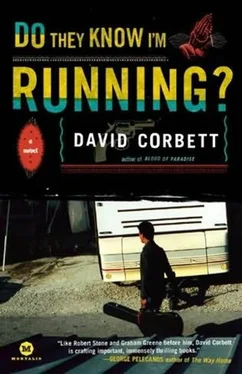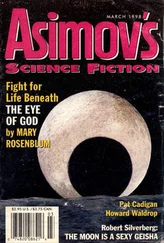“NO OFFENSE, MIND YOU, BUT I CAN’T BELIEVE YOU HONESTLY thought you could pay some clown at one end of the pipeline and think he’d get you all the way home. Those days are over, folks. Have been for a while.”
His name was Rick Bergen, the resourceful American eccentric the priest had collected. Floating somewhere in his middle years, he was suntanned, well fed but not pudgy with a full head of ash-blond hair. Laugh lines creased his eyes, a handclap of a smile.
They were gathered around the dining-room table, Bergen and Lupe and Roque and Samir. Father Luis had gone off to bless a local fisherman’s lancha; Dolor was mending altar linens in the sacristy. The basket of chapulines sat at the center of the table, back for an encore. Everyone but Bergen ignored them, though his enthusiasm was almost infectious.
“I relied on my cousin to arrange that side of things,” Roque managed to say. He still felt only half there, the other half still on the phone, waiting for Tía Lucha to come back on the line.
“Your cousin misunderstood the playing field,” Bergen said.
The man dressed, Roque thought, as though hoping to be invisible: simple sport shirt, tan linen slacks, no jewelry beyond a weatherproof watch. He could have vanished in any crowd of expats. When asked what it was he did, he’d replied simply that he “tried to help out here and there.” At one point he let slip that he was a pilot, or had been.
Roque stared at the tiny basket of fried grasshoppers as though the things might come alive. “My cousin paid the same people to come across just a few months ago.” He heard his voice as though he were sitting in a different room. “It worked out okay then.”
Bergen snagged a fistful of chapulines from the basket, tumbled them like dice in his palm, popped a few in his mouth. “Your cousin got lucky.”
Across the table, Lupe had drifted off into her own world, unable to follow the English. When she glanced up, Roque ventured an absent smile. Pregnant, he thought as she timidly smiled back. I won’t punk out like my old man, end up nothing but a question.
Samir slouched in his seat, one arm hooked across his chair back, eyeing Bergen like he was poisonous. “Okay. We are unlucky. Are you here to help or call us names?”
Bergen chafed his hands to rid them of lingering bits of insect. “I’d say that depends. I need to know a little more about who I’m dealing with. You in particular.” His eyes shuttered with vaguely hostile mirth. “And don’t lie to me. I’ve spent some time in your part of the world, not just this one. I don’t fool easy.”
Samir, thin-skinned as always, rose to the bait. “Let me tell you something, I have not lied to you. What have I had time to lie about? You have been blah-blah-de-blah ever since you walked in the door.”
That seemed only to amuse Bergen further. “From what I hear, you proved yourself better than average with a weapon out there the other night. You held off an ambush almost single-handed.”
“Not true.” Samir nodded toward Roque. “I had help.”
Bergen’s smile lamped down a notch. “You’ve got a military background. You’re an Iraqi Arab. You told that much to Father Luis. You either come clean with me or you can find your own fucking way to America.”
Even Lupe, lost behind the language barrier, detected the change in temperature. She glanced back and forth between the two men, who were locking eyes, then turned to Roque for reassurance. He offered a shrug, still feeling strangely disembodied, as though floating over the table, watching himself.
“I was in the war with Persia,” Samir said finally with a flutter of his hand, as though nothing could be more matter-of-fact.
“Excuse me but I find that puzzling,” Bergen said. “Palestinians normally didn’t serve in the Iraqi military, even in the war with Iran.”
“How do you know these things?”
“Like I said, I’m no stranger to that part of the world. Besides which, I’m a pilot. You spend a lot of time hanging around airfields, waiting for people and things-or money-to show up. Plenty of time to catch up on your reading.”
Samir leaned in toward the table. “A pilot for who-the airlines? The CIA? The cartels?”
Bergen chortled, it was all grand fun. “We’ll talk about me when the time comes. How did you wind up in the army?”
“When will come the time to talk about you? Why not now?”
“I’m not the one looking for a favor.”
Outside, Father Luis’s ancient Volkswagen puttered up the gravel drive from the coastal road. Somewhere, a dog started barking.
“So that’s how it is,” Samir said. “We’re in need, at your mercy. You know all the promises we have had. And what we paid to get them. Until you show me you have something real to offer, not just more promises, I have nothing to say.”
A faint scent of gasoline wafted in through the open window as the door to Father Luis’s Volkswagen slammed shut and his footsteps crunched the gravel. Nodding that direction, Bergen said, “The padre vouches for me. Who vouches for you?”
“And what do I know of this priest?”
As though on cue, Father Luis appeared in the doorway, nodding toward his company, oblivious to what they were saying. Dusting off his glasses with a handkerchief, he looked in need of a nap and a shave. Roque wondered if Samir might not be on to something: What did they know of this man? Returning his glasses to his face, the priest blinked and smiled, then shuffled off to join Dolor in the sacristy.
“Oh what the hell, let’s move the ball down the field.” Bergen made one last attack on the basket of chapulines , tipping it toward him, looking for the last few tidbits. “No, I did not fly for the airlines. I was trained in the air force, served my first tour at Ramstein which, as you may or may not know, has airlift and supply responsibilities for the Middle East. I got transferred to Davis-Monthan in Tucson just in time for the invasion of Panama, Operation Just Cause-or as we called it, Operation Just Because. I bagged out of the service after my second tour and found work in Phoenix, flying businessmen around, them and whoever they wanted to impress or bribe or screw. Flew all over the Southwest, plus Cancún, Belize, Baja, down here. You meet a lot of colorful people in the air, especially in a Gulfstream. I met a few who had some seriously out-of-the-way projects, so far out in the middle of bumfuck nowhere the roads were a rumor. I got work hauling in gasoline, food, clothes-and no, I didn’t fly back with a hold full of dope. Never. It was a pretty decent living for a while, until the men I transacted with left for a meeting one afternoon in Colima and never came back. That happens down here, as I’m sure you can guess. I didn’t care much for the men who took their place. Since then, I’ve been improvising.”
A boy attending a small herd of goats along a path through the cornfield started tooting a recorder. Beyond him, the sky seemed triumphantly blue, streaked with bright cloud.
Samir said, “Why settle here?”
“I’d been to the area off and on, carting clients down here to the beaches or up to Oaxaca de Juárez for the art. I bought myself some property through a presta nombre , a name lender. Foreigners can’t own property within fifty clicks of the coast and I didn’t want to go through a fideicomiso , a bank trust. Had plans to build myself the beach house of my dreams. It’s a charming place. People think goats are the devil, black dogs are good luck, mescal cures diarrhea and skunk meat clears up acne.
“Anyhoo, prices started going through the roof the past few years and greed never sleeps. My presta nombre got himself in serious need of a kidney that never materialized-don’t think I didn’t try to find him one-and under Mexican law his heirs inherit the property, not me. His widow and kids knew a bargain when it fell out of the sky. But I like it here, didn’t feel like letting them run me off. They want to cheat me, they can look me in the eye. Not that that’s a problem, mind you. The Mexican conscience knows how to adapt. Thousands of years of getting screwed will do that.”
Читать дальше












